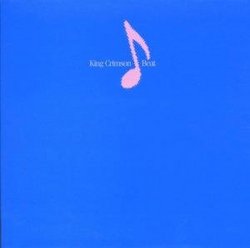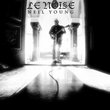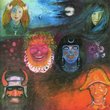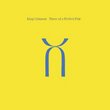| All Artists: King Crimson Title: Beat: 30th Anniversary Editions Members Wishing: 4 Total Copies: 0 Label: Caroline Release Date: 5/15/2001 Album Type: Original recording reissued, Original recording remastered Genres: Pop, Rock, Classic Rock Styles: Progressive, Progressive Rock, Psychedelic Rock, Album-Oriented Rock (AOR) Number of Discs: 1 SwapaCD Credits: 1 UPC: 724381011621 |
Search - King Crimson :: Beat: 30th Anniversary Editions
 | King Crimson Beat: 30th Anniversary Editions Genres: Pop, Rock, Classic Rock
Beat is an album filled with varied guitar textures, highlighting Robert Fripp's Frippertronic tape techniques, explorations and Bill Bruford's uncommon drum rhythms. 8 tracks. 2001 reissue. Standard Jewelcase. |
Larger Image |
CD DetailsSynopsis
Album Description Beat is an album filled with varied guitar textures, highlighting Robert Fripp's Frippertronic tape techniques, explorations and Bill Bruford's uncommon drum rhythms. 8 tracks. 2001 reissue. Standard Jewelcase. Similar CDs
|
CD ReviewsHaunted by the Future Snow Leopard | Urbana, IL | 12/25/2002 (4 out of 5 stars) "First a thank you to Rorscach12 for pointing out that the title of the album refers to the writers of the Beat Generation. The sense of looking backward to our most forward-thinking poets actually colors the whole album.More than with "Discipline" (which is often regarded as perfect), "Beat" is accused of stepping with both feet into the poop of pop. A very strange assertion, considering the presence of "The Howler," "Requiem" and "Satori in Tangier". It's not really fair to say that "Beat" is weaker than "Discipline"; maybe it's not as consistent, but that assumes that the album is aiming at the same kind of effect as "Discipline"."Neal and Jack and Me", for instance, with intertwining gamelan-guitar lines, driving bass, supra-subdued drums, a killer bridge, and the growlingest vocals from Adrian so far, every bit deserves fair comparison with "Discipline". Arguably, it's "Discipline" that needs to measure up here."Heartbeat" is decidedly straightforward, definitely a candidate for an Adrian Belew solo album. Everyone cheered when elder Crimson played straight up hippie-pop ("Cadence & Cascade" and "I Talk to the Wind") way back when, without crying sell-out. Why now? I invite the listener to ignore structure for a minute, and listen to the soundscape this "pop" song presents: the gorgeousness of Bruford's drums, the water-like smoothness of the guitar, the understatement of the solo, the tastefulness of the bass. Pop music hasn't a clue how to put something like this together, and the simplicity chosen here by the band effectively allows its elegance to shine through. I'd like to hear Belew sing it with more conviction though."Satori in Tangier" is definitely a highpoint on the album. Moreover, it's the first peek back at the more aggressively progressive Crimson of old, as a prelude to side 2 (and "Three of a Perfect Pair") to come. It's like Fripp is itching to unleash his demons again, and all this discipline is getting to him. "Satori" is a beautifully put together piece. The gorgeous mellowness of its middle section makes the crashing return of the opening theme spine-tingling. The rhythm guitar tone Belew uses here was amazing way back when, and is still exquisite. Pop this is way not."Waiting Man" is lyrically and vocally a ballad, floating on top of a more energized variation of the drums of "The Sheltering Sky". It reminds me of the way Bowie crooned over the top of driving music on "Station to Station". The bridge presents a nod to the song "Discipline", but one-ups the other song with more beat and drive. The solo is an amazingly sonic, glassy thing straight out of Belew's book of weird sounds so that, once again, this is decidedly nothing like pop."Neurotica" could be said to be the "Indiscipline" of this album, another essay on the insanity of urban life. Sonically, however, it is much more crushing and interesting. Compositionally as well, the sudden musical breaking off for the "chorus" is especially surprising and effective, all the more so for the dreamy tone of Belew's voice. In a way, it's seems like an extended expansion of "Satori" structurally. In general, it's not just not pop, it's anti-pop and draws on the gargantuan assault sensibility of old Crimson, skysaw guitar and all.King Crimson's mania for contrast puts the sentimental "Two Hands" next. With drums reminiscent of "Waiting Man," the simplicity of "Heartbeat", and the guitar tone of "Satori", it seems a bit like a redundancy. The lyrics don't work so well in its depiction of sensual passion, partly because Belew's delivery seems more spaced-out than sensual. If nothing else, the song serves as an interlude and setup to the next song, though I tend to program it out."The Howler" finally lets the monster out of the closet. Although it still features passages of intertwined guitar lines (now distorted, rather than crisp and clear), bass, drums and guitars are here dedicated to putting out a vicious wall of noise. The dancy little bridge in the middle might seem kitschy on the one hand, but it goes very nicely towards setting up the shredding skysaw solo to come, which kicks out further than any other passage from 80s Crimson. Apparently, though, this isn't a popular song with other fans. It's one of my favorites on the album. Incidentally, it's not pop."Requiem" is the most obviously retrospective piece on the album. Basically, it is a distinctly frenetic Fripp solo, perversely atonal (and marvelously so), with a dirge-like bass, and nervous, jittery drums. Belew then weighs in with an intensely metallized guitar wail and feedback, so that the piece simultaneously reaches both forward and back 10 years, to the Crimson of old and to "Thrakattak" to come. A 1974 Crimson improvisation performed by the 80s lineup, it is uncompromising, harsh and, in the final analysis, a surprisingly effective musical gesture. The close of the piece, especially, with its lone sustained note over Levin's sinking bass line, is a very somber, and satisfying end."Beat" could be said to be of two minds in its effort to discover an effective marriage of "Discipline" and the desire to let the howler howl as of old. As a "transitional" album, that means that its overall feel will not be as monolithic as "Discipline". Is "Discipline" better then? Who cares. Except for "Two Hands", which is undeniably cheesy (however well-done), "Beat" carves out a peculiar soundscape of its own that, like "Requiem", is in the final analysis strangely compelling and effective, partly because it risks more in the direction of what King Crimson would become." 80s pop de la Crim == AWESOMENESS. Lord Chimp | Monkey World | 04/23/2003 (5 out of 5 stars) "It has a share of detractors I guess, but I think _Beat_ earns a respectable place in the King Crimson catalogue. Perhaps the most consistently accessible they've ever sounded, _Beat_ is also important because it most successfully bridges the unique sound of Crimson's 80s rock language and the hook laden new wave influence. Catchy music is an art in itself, after all -- especially when you make no compromises with a song's complexity.It's (almost) all quite ear-pleasing and accessible, yet complex enough to be consumed by it. Hard to believe any band could make such a catchy song out of "Neal and Jack and Me", with its scintillating interlocking guitar parts like every sparkle on a diamond in slow-motion, and weird-as-hell vocal lines. Nor would one expect 80s pop to feature the hair-raising backwards guitar solo or tricky rhythm interplay that appears on the hook-boasting anthem "Heartbeat". And leave it to Adrian Belew to make a catchy tune out of the complex "Waiting Man", with the guitars ostinati interweaving like little whirling galaxies and exotic pointillist rhythm work of the Mighty Levin-Bruford team. A mystical song._Three of a Perfect Pair_ doesn't really have a ballad, so "Two Hands" is the only other ballad track aside from "Matte Kudasai" that appeared in this King Crimson embodiment. It's a beauty: minimal and transparent and weightless, its hushed tones as light as the whisk of a little bird's wing. The creamy sustain of the guitar solo on this one is one of the sweetest examples of the delicious guitar sounds Belew and Fripp employed on these albums. There's "Neurotica", about which I've heard a lot of people displeased or annoyed, but I think it is one of the BEST KING CRIMSON SONGS. It's so insane but twistedly sensible that listening to it is like every neuron in your brain suddenly being fired at once and you become a god. Okay, that's a little over the top but it's great -- probably the best "sound of insanity" song I've ever heard. It isn't even possible to describe it, except "Bloodcurdling." "The Howler" has a more disorienting gamelan arrangement that literally makes me dizzy (or maybe it was that poison hamburger...err, no, it's the song) Another facet of that experimental side appears in the doomful improv "Requiem" -- Fripp plays a stretched solo over some Frippertronics before the rest of the band appears and lays waste to the sepulchral calm. From here, it is divine anarchy, as musicians search for a common End, but reciprocally work with and against each other as if possessed by demons. A twisted monster with an ending that sounds like a sigh of defeat, even though I think they achieved their goal.One of my favorite pieces is the instrumental "Sartori in Tangier", which sounds like a surreal, joyful parallel to the alien halcyon of "The Sheltering Sky"...stunning. You might think this review is ridiculous but King Crimson is a pretty incredible experience, even at their "poppiest." If you like apples in vans and sandwiches, you should buy this album." A Slightly More Accessible Twin to "Discipline" Bud | Seminole, Texas, USA | 11/28/2003 (5 out of 5 stars) "If "In the Wake Of Poseidon" was the carbon copy of "In the Court Of the Crimson King," then "Beat" is the identical twin of "Discipline." It carries most of the same elaborate musical and studio techniques, and the same amazingly complex structures. However, the songs on this 1982 release are often more easily accessible than those on "Discipline"; for instance a song like 'Heartbeat' is a much more easily approached than other great songs that appeared on "Discipline," like 'Thela Hun Ginjeet.' However, this is still King Crimson, so the accessibility is at a minimum. "Beat" is also the first Crimson album to possess a sound that actually reflects its era--here, much of the music has a distinctively 80s flare. With most albums, the ring of the 80s would be a drawback, but with "Beat" is somehow sounds perfect.
The lineup of Robert Fripp, Adrian Belew, Tony Levin, Bill Bruford--arguably one of the band's best versions--soars as high as it did on their previous album together, and sometimes soars identically; the guitar of the opener 'Neal and Jack and Me' features a guitar noise that sounds almost exactly like 'Frame By Frame,' a past song. But elsewhere, "Beat" triumphs. Belew's vocals are as brilliantly loony as ever, especially on the never-dull 'Neurotica.' 'Waiting Man' meanwhile features a more subtle vocal, the heartache it induces matched only by Fripp's achieving guitar. This is also perfected on 'Heartbeat' and 'Two Hands,' the latter of which was lyricized by Margaret Belew in a less inspiring manner. The almost anthemic 'Requiem' closes the album suitably. "Beat" is probably the closest the Crims ever came to actually sounding like something else that was being released at the time. And though it sounds much like an 80s album, "Beat" finds King Crimson throwing away any cliche associated with it and making it their own." |

 Track Listings (8) - Disc #1
Track Listings (8) - Disc #1

